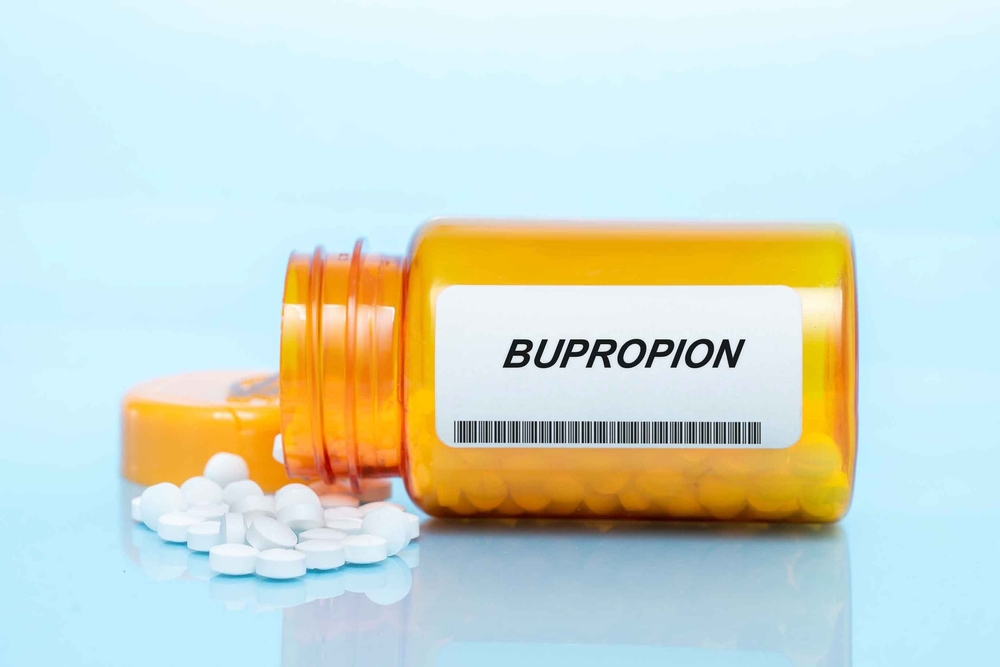Last Updated:
May 16th, 2025
Taking Bupropion as Part of the Detox Process
What is Bupropion?
Bupropion, also known as Wellbutrin, is a prescription medication used to treat depression and help people quit smoking. It is often prescribed under brand names like Wellbutrin for depression and Zyban for smoking cessation.
Unlike many other antidepressants, Bupropion does not belong to the selective serotonin reuptake inhibitor (SSRI) class. Instead, it works differently in the brain, making it a suitable option for those who do not respond well to SSRIs.
For people struggling with depression, Wellbutrin can help improve mood, energy levels and motivation. It is sometimes prescribed alongside other antidepressants for a more comprehensive treatment approach.
As a smoking cessation aid, Bupropion reduces cravings and withdrawal symptoms, making it easier for people to quit smoking. While it does not remove the habit itself, it helps reduce the physical dependency on nicotine, giving people a better chance at long-term success.

How is Bupropion taken?
Bupropion is taken in tablet form, typically once or twice a day, depending on the dosage and medical condition being treated. The medication is usually prescribed as an immediate-release (IR), sustained-release (SR) or extended-release (XL) tablet, with XL versions designed to release the drug slowly throughout the day.
When used for depression, doctors often start with a low dose and gradually increase it. This helps the body adjust and minimises potential side effects. For smoking cessation, Wellbutrin is usually started about one to two weeks before quitting smoking, allowing the medication to build up in the system.
How does Bupropion work?
Bupropion works by affecting the neurotransmitters (dopamine and norepinephrine) which are the two chemicals in the brain that play key roles in mood regulation and reward processing.
- Dopamine is involved in pleasure and motivation. Low levels are often linked to depression, low energy and lack of interest in activities.
- Norepinephrine is responsible for alertness and stress response. It helps regulate energy levels and focus.
By increasing the levels of these neurotransmitters, Bupropion boosts mood, improves energy and reduces cravings for nicotine. Unlike SSRIs, which primarily target serotonin, Bupropion does not typically cause drowsiness or weight gain, making it a preferred option for some people.
Can anyone with depression take Bupropion?
While Bupropion is effective for many people, it is not suitable for everyone. Certain medical conditions and risk factors can make it unsafe or less effective.
Wellbutrin may not be recommended for people with:
- A history of seizures, as the medication can lower the seizure threshold and increase the risk of seizures.
- An eating disorder (such as anorexia or bulimia) can cause electrolyte imbalances that further increase the risk of seizures.
- Severe anxiety or panic disorders, as Bupropion can be stimulating, leading to increased restlessness or agitation.
- Bipolar disorder, unless combined with a mood stabiliser, may trigger manic episodes.
- A history of alcohol or drug withdrawal, as sudden cessation of alcohol or sedatives while on Bupropion can increase seizure risk.

Doctors carefully assess each person’s medical history before prescribing Bupropion to ensure that it is safe and suitable for their specific condition.
Are there side effects of taking Bupropion?
Like any medication, Bupropion may cause side effects, though not everyone experiences them. Most side effects are mild and tend to improve as the body adjusts to the medication.
Common side effects could include:
- Dry mouth: Some people notice a persistent dry feeling, which can be managed by staying hydrated.
- Nausea or stomach discomfort: Eating before taking Bupropion may help.
- Trouble sleeping: Since Bupropion can be stimulating, taking it earlier in the day might reduce sleep disturbances.
- Dizziness or headache: These symptoms often improve after the first few weeks.
- Agitation or nervousness: A temporary increase in anxiety may occur, especially when starting treatment.
If side effects become severe or do not go away, speaking with a healthcare provider is important.
Is there a risk of Bupropion abuse?
Although Wellbutrin is not classified as a controlled substance, there have been reports of misuse. Some individuals have crushed and snorted the medication or even injected it, seeking a stimulant-like high.
Recreational users have compared the effects of Bupropion to a weaker version of cocaine, describing a short-lived euphoric rush. However, misusing the drug in this way is extremely dangerous and can lead to severe side effects, including:
- Seizures
- Hallucinations
- Confusion and paranoia
- Rapid heart rate and high blood pressure
Because of this potential for abuse, doctors monitor its use carefully and typically do not prescribe it to individuals with a history of substance misuse.
Is Bupropion addictive?
Bupropion is not considered physically addictive, meaning it does not cause the same type of dependency as opioids or stimulants. It does not create intense cravings or withdrawal symptoms in the same way.
However, some people may develop a psychological dependence on the medication. Because Wellbutrin helps stabilise mood and energy levels, individuals who have struggled with depression may feel as though they cannot function without it.
This psychological reliance is similar to how some people feel about other antidepressants. They do not crave the medication in the way someone addicted to opioids might but they may worry about how they will cope without it. This is why doctors often recommend gradual tapering rather than stopping the medication abruptly.
Does Bupropion cause withdrawal symptoms if stopped abruptly?
While Bupropion does not cause classic withdrawal symptoms like nausea or sweating, stopping it suddenly can lead to a discontinuation syndrome. This happens because the brain has adapted to the increased levels of dopamine and norepinephrine.
If stopped abruptly, a person may experience:
- Irritability and mood swings
- Difficulty concentrating
- Fatigue and low energy
- Increased anxiety
- Sleep disturbances
Because of these potential effects, doctors recommend tapering off Bupropion gradually rather than stopping it all at once. This allows the brain to adjust and reduces the likelihood of experiencing discomfort.
Get the right support with Addiction Helper
If you’re struggling with mental health challenges, you don’t have to face them alone. At Addiction Helper, we provide confidential guidance to help you find the right support, whether you need therapy, counselling or a structured treatment programme. Our professional team can recommend services tailored to your needs, ensuring you get the care you deserve.
Call our free helpline today or chat with us online for expert advice. Your mental health matters, and support is just a conversation away.
Our compassionate team are ready and available to take your call, and guide you towards lasting the lasting addiction recovery you deserve.
Frequently Asked Questions
(Click here to see works cited)
- Rajnish Mago, MD; “Bupropion after Nonresponse or Partial Response to an SSRI or SNRI?” Psychiatric Times, MJH Life Sciences, www.psychiatrictimes.com/view/bupropion-after-nonresponse-or-partial-response-ssri-or-snri. Accessed 19 Feb. 2025.
- Huecker MR, Smiley A, Saadabadi A. Bupropion. [Updated 2024 Sep 2]. In: StatPearls [Internet]. Treasure Island (FL): StatPearls Publishing; 2025 Jan-. Available from: https://www.ncbi.nlm.nih.gov/books/NBK470212/
- Illinois, University of. “Bupropion: Side Effects, Dosage, Uses and More.” Healthline, Healthline Media, 8 Jan. 2025, www.healthline.com/health/drugs/bupropion-oral-tablet.
- Stall N, Godwin J, Juurlink D. Bupropion abuse and overdose. CMAJ. 2014 Sep 16;186(13):1015. doi: 10.1503/cmaj.131534. Epub 2014 Apr 28. PMID: 24778361; PMCID: PMC4162783.
- Berigan TR, Harazin JS. Bupropion-Associated Withdrawal Symptoms: A Case Report. Prim Care Companion J Clin Psychiatry. 1999 Apr;1(2):50-51. doi: 10.4088/pcc.v01n0205. PMID: 15014696; PMCID: PMC181057.

